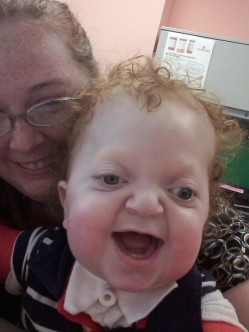In a story on Connect last week, you read about one of our precious patients – 3-year-old Christopher – and his mom Jessica Coker. Jessica shared how shortly after giving birth to Christopher she learned he had very complex medical needs and would require a level of care and health care management that, just days before, she could not even fathom. But like most parents, she received the devastating news as a charge to immediately learn all she could to be her child’s most diligent and resourceful health care advocate.
I think about families like the Cokers all the time. These families and their children remind us why we are here, and they drive the work we do at Texas Children’s. They are why I am so very excited about today – today is the debut of STAR Kids, a new Texas Medicaid managed care program that will provide benefits to more than 180,000 children and young adults who have special health care needs.
and they drive the work we do at Texas Children’s. They are why I am so very excited about today – today is the debut of STAR Kids, a new Texas Medicaid managed care program that will provide benefits to more than 180,000 children and young adults who have special health care needs.
Texas Children’s Health Plan is one of three managed care organizations offering the STAR Kids plan in Harris, Jefferson and Northeast service areas. But make no mistake – this is a system-wide interest for Texas Children’s. We expect to enroll thousands of new children in the Health Plan. Many of these children are already receiving some level of care at Texas Children’s, and many more will be new to our system. We have a responsibility to ensure exceptional, seamlessly coordinated health care across our system for all of these children.
Many of the children in STAR Kids will be cared for by a host of specialists. Christopher, for example, sees about 24 specialists within and outside of the Texas Children’s system. Christopher’s well-being and that of thousands of children relies squarely on the support they have in navigating the health care system. These children need primary care, outpatient subspecialty services, diagnostic services and therapies, and we have an incomparable and vast network of care. But the best care in the world will not benefit them if they do not have access to it when they need it. Our involvement in STAR Kids is an opportunity for us to stand in the gap for these children, and our new Complex Care Clinic is one way we are doing that. Our care coordinators – registered nurses and certified social workers – provide individual treatment plans to make sure these children have preventive care and routine well visits, urgent visits and follow-up care.
And while our primary driver is ensuring the right care for the children in the program, understand that we also have a huge financial stake in the success of STAR Kids. Efficiently and proactively managing care for these children – and all of our patients, for that matter – means we not only provide the right care, but we respond to their needs in the right place and at the right time. Getting families connected to appropriate resources, providing planned, well-coordinated care, and having robust home based services will help their children avoid unnecessary emergency room visits and unplanned hospital stays.
As a result, they stay healthier, and they enjoy a better quality of life. That is why we are here at Texas Children’s, and that is success for everyone – our patient families and for us. Our mission is to care for these children. Our charge is to do it well.
Learn more about STAR Kids and Texas Children’s involvement.

